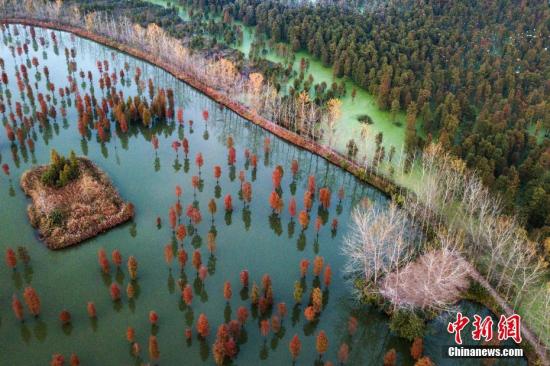China News Service, January 5th. Luo Guosan, Director of the Basic Department of the National Development and Reform Commission, pointed out on the 5th that the proportion of good cross-sections in the Yangtze River Basin increased from 82.3% in 2016 to 91.7% in 2019, and further increased to 96.3% from January to November 2020. The proportion of water quality inferior to Grade V in the Yangtze River Basin dropped from 3.5% in 2016 to 0.6% in 2019. In 2020, the elimination of water bodies inferior to Grade V will be achieved for the first time.
Data map: The Yangtze River Basin ushered in the most beautiful season of the year. Aerial photography of nearly 1,000 acres of metasequoia forests in Luhe District, Nanjing.
Photo by China News Agency reporter Yang Bo
The National Development and Reform Commission held a special press conference on the 5th to introduce the results of the fifth anniversary of the development of the Yangtze River Economic Belt.
In addition to the significant changes in the water quality of the Yangtze River Basin, Luo Guosan pointed out that the ecological environment has also undergone significant changes.
The capacity of urban domestic sewage and garbage treatment has been significantly improved. The length of urban sewage collection pipelines at prefecture-level and above has increased by 20.7% compared with 2015. The daily treatment capacity of urban and county domestic garbage has increased by 60.7% compared with 2015.
A large number of high-pollution and high-energy-consuming enterprises have been shut down and banned, and more than 8,000 chemical companies along the river have been relocated.
The Yangtze River coastline has been rectified in an all-round way, 1,361 illegal docks have been completely rectified, 2,441 illegal and illegal projects have been cleaned up and rectified, green ecological corridors on both sides of the bank have gradually formed, and the waterfront space of cities along the river has returned to the lives of the people.
"The Yangtze River's'ten-year fishing ban' has been fully implemented, and the trend of biodiversity degradation has been initially curbed. The finless porpoise, known as the smiling angel, is increasingly appearing in people's vision." Luo Guosan said.

